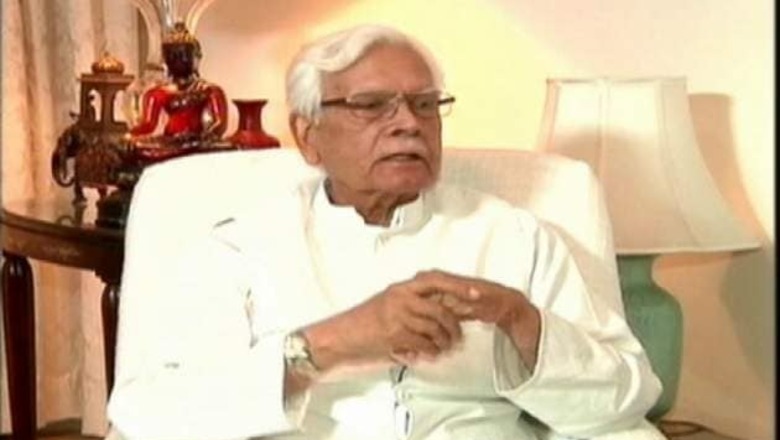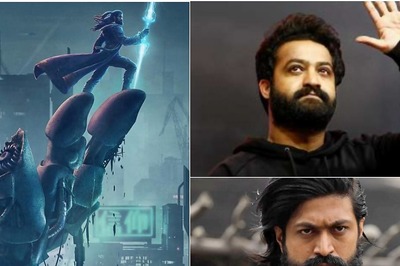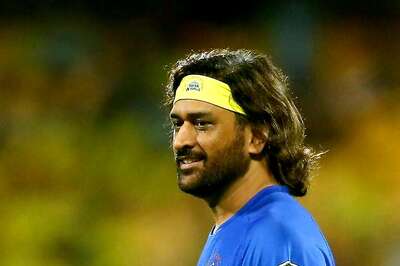
views
In an interview with Vivek Tejuja, former Union minister Natwar Singh talks about his life as author.
Here is the full transcript of the interview:
Vivek Tejuja: You are already a prolific writer and have written many books including 'Walking with Lions', 'My China Diary' and many others recounting your vast diplomatic experience. Hence given the content, what made you write this book? What were the motives?
Natwar Singh: There were no motives as such. I wanted to leave behind a legacy for my son and grandsons.
Vivek Tejuja: The book has a chapter dedicated to Sonia Gandhi. The media was rife with speculation on the possible reason for visit of Sonia Gandhi and Priyanka Vadra to your house just days before the release of the book. As widely speculated in the media, is this book written with the intent to settle any kind of score with Sonia Gandhi? Is this your way of getting back for how the entire Volcker controversy was handled by Congress and Sonia Gandhi?
Natwar Singh: No, not at all. Please refer to my answer to your earlier question.
Vivek Tejuja: You have described Manmohan Singh's tenure by Winston Churchill's quote of Lord Curzon's life as "The morning was gold, the afternoon was silver, the evening lead". You have described in the book that Manmohan Singh didn't have a foreign policy and that entire diplomatic corps was demoralized. If perhaps you had to change three things in the way Congress ran the government, what would they be and why?
Natwar Singh: Just to clarify, I have not said anything about the diplomatic corps in my book. However, if I were to change three things in the way the Congress ran the government, I would say a) there should be no corruption b) there should not be a diarchy, only one power centre c) the functioning of the government should be transparent and should include family planning.
Vivek Tejuja: You have mentioned an interesting episode where Sonia Gandhi and you flew to a little town called Vladimir in the summer of 2005 during the visit to Russia. You describe the episode where Sonia Gandhi visited the prison which had held her father captive during World War II. That must be have been a very emotional moment. Can you describe the whole episode? Did Sonia Gandhi discuss about her father, his involvement in the war and capture and finally his years of captivity in prison?
Natwar Singh: Yes, it was a very emotional moment for Sonia Gandhi, and I have described the entire episode in detail in my book. She did sometimes discuss her father with me.
Vivek Tejuja: You have mentioned in the book that there was an alleged attempt at derailing your appointment as External Affairs Minister by the American Lobby. You have also in various interactions with the media alleged that Americans tried hard to prevent Pranab Mukherjee from becoming the Finance Minister and that CIA penetrated every sphere of UPA. There has been lot of speculation in online media about American involvement and instigation in Tahrir Square type protests around the world. In your opinion, could the Jantar Mantar and Jan Lokpal movements also have such instigations?
Natwar Singh: In 2013, Mr Edward Snowden, through Wikileaks, exposed many CIA activities. Recently, External Affairs Minister Sushma Swaraj told US Secretary of State John Kerry that the US' snooping in Indian affairs is not acceptable. These facts, I think, amply prove my points regarding the American lobby, as given in my book.
Yes, there was pressure from America to not make President Pranab Mukherjee the finance minister, and also against my getting the external affairs portfolio. I have written in my book about conversations I had with Sonia Gandhi and Manmohan Singh in this regard.
I have no knowledge about any American instigation in the movements you mention.
Vivek Tejuja: You have hinted in the book, that a media witch hunt was propagated on you. You have talked about in the book about mysterious appearances of stories and how various media publications refused to publish your articles. Was there similar pressure with regards to the release of the book?
Natwar Singh: No, there was no pressure. On the contrary, there was a great deal of excitement about the release of my book.
Vivek Tejuja: It has been widely speculated in the media that the prime reason for perceived dysfunctionality in the UPA government was due to multiple power centers and lack of coordination and cooperation among the senior leaders of the party and the cabinet. However in the book, you have mentioned that Sonia Gandhi discreetly monitored the functioning of the most important ministries and even alleged that there was a mole in your office feeding information. Hence could it be possible that the party president was aware of the workings of the government and the perceived lack of coordination and cooperation was due to misplaced priorities?
Natwar Singh: The answer to your question lies in my book.
Vivek Tejuja: Did you ever face a challenge while writing this book? Did it ever cross your mind to give up on this and not write about it? You have already announced that you are planning to write a sequel for this book which is to be called "My Irregular Diary". Are there sections and episodes in your vast political and diplomatic life that you considered including in your present book but changed your mind later on?
Natwar Singh: My next book will not be a sequel to this. I will write another book after Sonia Gandhi's book is published.
To answer your earlier points, no, there was no question of giving up. I have written whatever I wished to write in this, nothing was removed.
Vivek Tejuja: Where would you categorize Natwar Singh, the writer as, a student of history penning the eye accounts for future generations? A diplomat who is penning his vast experience to give a varied perspective of events? Or as an insider of the Lutyen's political establishment penning the memories of the machinations behind it all?
Natwar Singh: I think, a combination of all three.
Vivek Tejuja: How has your diplomatic career been? In your multi-faceted life, what does it take according to you to build and maintain relations? Given today's globalized world and its challenges, what is your advice to young Indian leaders who are at the forefront of an Indian conquest of the world through both Indian and Multinational firms?
Natwar Singh: I can sum up my diplomatic career in four words-exciting, frustrating, rewarding, successful.
I feel goodwill, trust and hard work are essential to maintain good relations.
Regarding your last question, I wish I knew what to say!
Vivek Tejuja is Manager, Customer Engagement, Books at Flipkart.com and loves to recommend books.




















Comments
0 comment